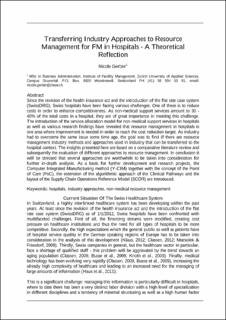Bitte benutzen Sie diese Kennung, um auf die Ressource zu verweisen:
https://doi.org/10.21256/zhaw-3461| Publikationstyp: | Beitrag in wissenschaftlicher Zeitschrift |
| Art der Begutachtung: | Peer review (Publikation) |
| Titel: | Transferring industry approaches to resource management for FM in hospitals : a theoretical reflection |
| Autor/-in: | Gerber, Nicole |
| DOI: | 10.21256/zhaw-3461 |
| Erschienen in: | International Journal of Facility Management |
| Band(Heft): | 5 |
| Heft: | 2 |
| Erscheinungsdatum: | 2014 |
| Verlag / Hrsg. Institution: | Georgia Institute of Technology |
| Verlag / Hrsg. Institution: | Georgia |
| ISSN: | 2150-3303 |
| Sprache: | Englisch |
| Schlagwörter: | Industry approaches; Hospitals; Non-medical resource management; Healthcare management |
| Fachgebiet (DDC): | 362.11: Krankenhäuser und verwandte Einrichtungen 658.2: Facility Management |
| Zusammenfassung: | Since the revision of the health insurance act and the introduction of the flat rate case system (SwissDRG), Swiss hospitals have been facing various challenges. One of these is to reduce costs in order to enhance competitiveness. As non-medical support services amount to 30-40% of the total costs in a hospital, they are of great importance in meeting this challenge. The introduction of the service allocation model for non-medical support services in hospitals as well as various research findings have revealed that resource management in hospitals is one area where improvement is needed in order to reach the cost reduction target. As industry had to overcome the same issue some time ago, the goal was to find if there are resource management industry methods and approaches used in industry that can be transferred to the hospital context. The insights presented here are based on a comparative literature review and subsequently the evaluation of different approaches to resource management. In conclusion it will be stressed that several approaches are worthwhile to be taken into consideration for further in-depth analysis. As a basis for further development and research projects, the Computer Integrated Manufacturing method (Y-CIM) together with the concept of the Point of Care (PoC), the extension of the algorithmic approach of the Clinical Pathways and the layout of the Supply Chain Operations Reference Model (SCOR) are introduced. |
| URI: | https://digitalcollection.zhaw.ch/handle/11475/1703 |
| Volltext Version: | Publizierte Version |
| Lizenz (gemäss Verlagsvertrag): | Lizenz gemäss Verlagsvertrag |
| Departement: | Life Sciences und Facility Management |
| Organisationseinheit: | Institut für Facility Management (IFM) |
| Enthalten in den Sammlungen: | Publikationen Life Sciences und Facility Management |
Dateien zu dieser Ressource:
| Datei | Beschreibung | Größe | Format | |
|---|---|---|---|---|
| 2017_Gerber_Transferring Industry_ijfm.pdf | 656.88 kB | Adobe PDF |  Öffnen/Anzeigen |
Zur Langanzeige
Gerber, N. (2014). Transferring industry approaches to resource management for FM in hospitals : a theoretical reflection. International Journal of Facility Management, 5(2). https://doi.org/10.21256/zhaw-3461
Gerber, N. (2014) ‘Transferring industry approaches to resource management for FM in hospitals : a theoretical reflection’, International Journal of Facility Management, 5(2). Available at: https://doi.org/10.21256/zhaw-3461.
N. Gerber, “Transferring industry approaches to resource management for FM in hospitals : a theoretical reflection,” International Journal of Facility Management, vol. 5, no. 2, 2014, doi: 10.21256/zhaw-3461.
GERBER, Nicole, 2014. Transferring industry approaches to resource management for FM in hospitals : a theoretical reflection. International Journal of Facility Management. 2014. Bd. 5, Nr. 2. DOI 10.21256/zhaw-3461
Gerber, Nicole. 2014. “Transferring Industry Approaches to Resource Management for FM in Hospitals : A Theoretical Reflection.” International Journal of Facility Management 5 (2). https://doi.org/10.21256/zhaw-3461.
Gerber, Nicole. “Transferring Industry Approaches to Resource Management for FM in Hospitals : A Theoretical Reflection.” International Journal of Facility Management, vol. 5, no. 2, 2014, https://doi.org/10.21256/zhaw-3461.
Alle Ressourcen in diesem Repository sind urheberrechtlich geschützt, soweit nicht anderweitig angezeigt.